| | | | | | | Presented By NetJets | | | | Axios World | | By Dave Lawler ·Feb 24, 2022 | | Welcome back to Axios World. - Today's edition (1,987 words, 7½ minutes) is focused almost entirely on Russia and Ukraine. May there be better days and better news ahead.
| | | | | | 1 big thing: Many Russians aren't buying the war Putin is selling |  | | | Photo illustration: Sarah Grillo/Axios. Photo: Mikhail Svetlov/Getty Images | | | | Vladimir Putin has launched an unprovoked ground war in a neighboring country after only the most perfunctory attempt to convince his own people, and with no groundswell of support behind him. Why it matters: That's a dangerous proposition for any leader, even an autocrat as entrenched as Putin. But while some experts believe high casualties or sanctions-induced economic distress could destabilize Putin's regime, others contend that a quick victory would solidify his historic legacy in many Russians' eyes. Driving the news: Hundreds of protesters marched through central Moscow Thursday night chanting "no to war," while hundreds more gathered in St. Petersburg, all despite an explicit threat of arrest from the Interior Ministry. That stands in stark contrast to the 2014 annexation of Crimea, when the government actively mobilized mass shows of support for a highly popular operation. - This time around, there was "no big demand" for war, and Putin — with his eyes apparently fixed on history rather than public opinion — hardly tried to generate one, says Alexander Baunov of Carnegie Moscow.
- Rather than patriotic fervor, Baunov sensed a slight "embarrassment" of Muscovites Thursday morning as they withdrew cash from ATMs in case Russia is cut off from the global financial system.
Breaking it down: Most Russians were not expecting war on any scale, let alone a full-scale invasion, but a majority also accepts Putin's argument that the West has created the crisis, says Denis Volkov, director of Russia's last independent pollster, the Levada Center. - Just 7% blamed the tensions over Ukraine on the Russian government according to one recent poll, Volkov says. The belief in Western culpability among most Russians "will not be shaken," he adds.
- Perceptions of Ukraine were also trending downward before the invasion, in a sign that the relentless coverage on state TV had an effect even as it generated a great deal of fatigue, Volkov says.
- Now public opinion is in flux. "It will depend on how long it will be, how bloody it will be, what the response of the West will be," and whether there is some form of protest movement, he says.
What to watch: Most of the groups that have rallied past protests have been systematically dismantled over the past few years, most notably Alexei Navalny's Anti-Corruption Foundation. - During court proceedings Thursday that could add 15 years to his prison sentence, Navalny accused Putin of launching the war "to cover up the theft from Russian citizens and divert their attention" from internal problems.
- Vladimir Ashurkov, the now-exiled executive director of Navalny's foundation, told reporters over dinner in Washington on Tuesday that the timing of the trial was no accident. "Unfortunately, this Ukrainian shitstorm is putting it into the shadows," he said.
- Ashurkov conceded that if Russia effectively absorbs Ukraine with minimal casualties and economic fallout, it could bolster Putin internally. Many in the business and governing elite have grown very concerned by Putin's maneuvers, he added, but Putin has shown little interest in any opinion but his own.
The bottom line: "Putin is starting to get more isolated from modernity, from the present time, and thinking of himself as a historic figure, making not politics but history," Baunov says. - He is indeed making history, but the domestic fallout could yet pull him back into the present.
Go deeper: Ukraine-Russia crisis latest developments |     | | | | | | 2. Russia seeks to "decapitate" Ukrainian government | 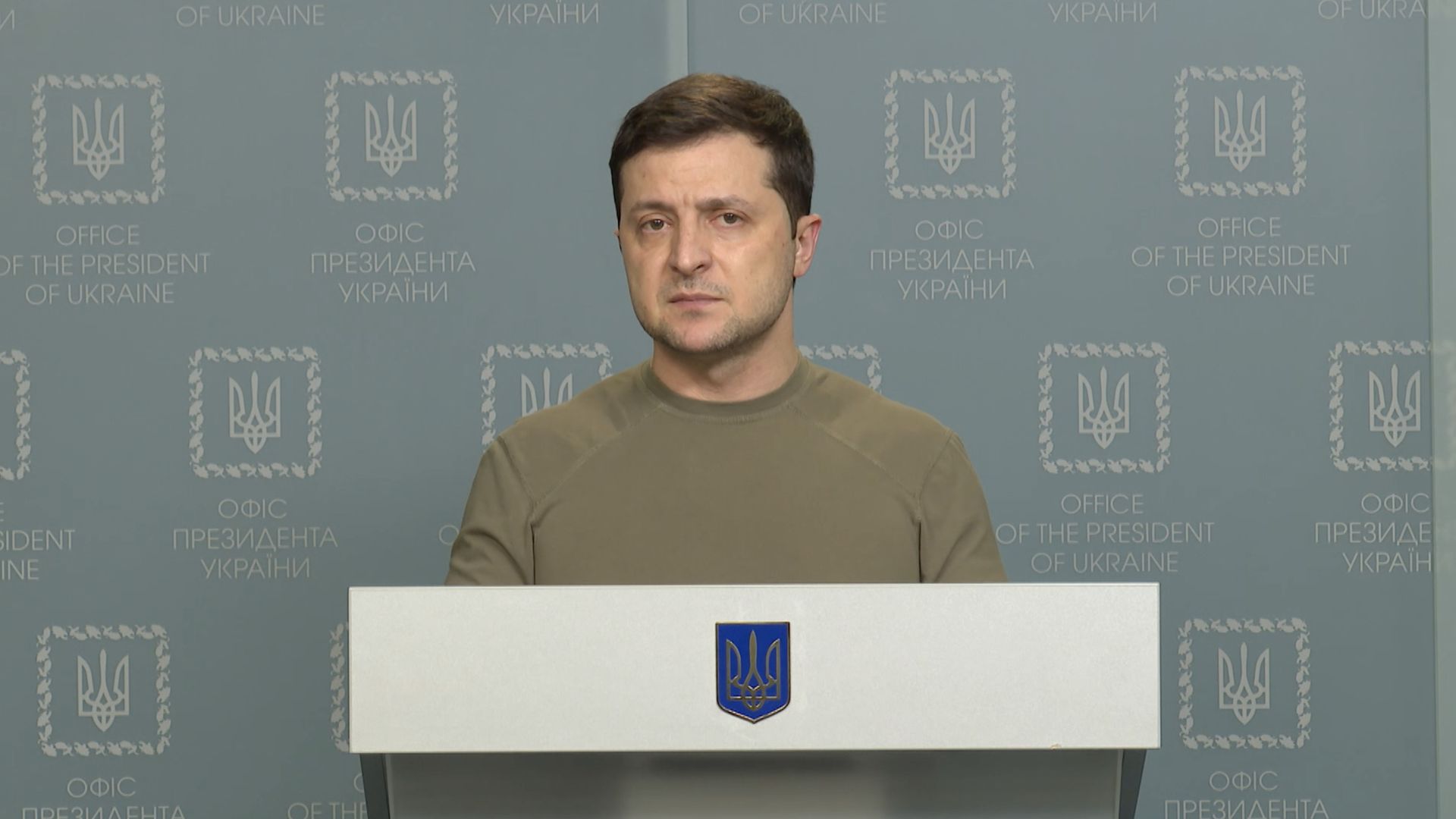 | | | Zelensky addresses Ukrainians on the situation. Photo: Ukrainian Presidency handout via Getty | | | | President Volodymyr Zelensky said tonight that 137 Ukrainian soldiers had been killed in the first day of fighting and announced a full military mobilization, with men 18–60 barred from leaving the country. What he's saying: Zelensky said Russian "sabotage forces" had entered Kyiv with the intention of "destroying the head of state" and targeting his family, but they would all be remaining in Kyiv. - That followed a Pentagon warning that Russia's primary objective appeared to be to "decapitate" the Ukrainian government.
- "We have been left alone to defend our state," Zelensky said, adding that he was grateful to those countries providing help and not just statements.
The latest: Every single soldier guarding a small island in the Black Sea was killed when the overmatched Ukrainian force refused to surrender under bombardment from a Russian warship. - The Ukrainian army claims that it has retaken a key airfield near Kyiv and inflicted heavy losses on the Russian forces that had captured it earlier in the day.
- But Russian forces pushed into Ukraine on three broad fronts, with the troops invading from Crimea in the south appearing to make significant progress. A Pentagon official said the heaviest initial fighting was near Kharkiv, a major city on the eastern border with Russia.
- Fighting on the northern border near the Chernobyl nuclear facility, which was overrun today, caused international alarm due to the risk from radioactive material. White House press secretary Jen Psaki said the U.S. was "outraged" by reports that Russian forces were holding the staff of the site "hostage."
- The UN said around 100,000 Ukrainians had fled their homes as of this evening. There are fears of a heavy bombing campaign overnight.
|     | | | | | | 3. Anticipating the Russian advance |  Data: The New York Times; Mapbox/OSCE; Map: Will Chase and Jared Whalen/Axios The fighting seen today was only "the very early hours" of the Russian campaign and involved a fraction of the total Russian force, says Michael Kofman, an expert on Russia's military capabilities at CNA. What he's watching: "I think we should expect a substantial Russian pincer movement to encircle Kyiv from the north," says Kofman, whose analyses on Russia's buildup and likely next moves have proved remarkably prescient throughout the crisis. - Thus far the Russian forces appear to have made the fastest progress from Crimea in the south, he says, but "it looks like they're advancing from the north toward Kyiv."
- If Russian forces break past the Ukrainian defenses near Chernihiv, given progress elsewhere along the northern border, "they may be able to advance rapidly to the river and cut off a substantial number of Ukrainian forces in the east."
- Russia has already conducted a major air assault, engaged the Ukrainian air defenses and air force, and fired cruise missiles on radar, command and control, air bases, and air fields, he says.
What to watch: But they have not unleashed the full force of their cyber capabilities, which could shut down key Ukrainian infrastructure. The bottom line: "Russia has quantitative and qualitative superiority over the Ukrainian forces across the board," Kofman says. |     | | | | | | A message from NetJets | | Why fly NetJets | | | 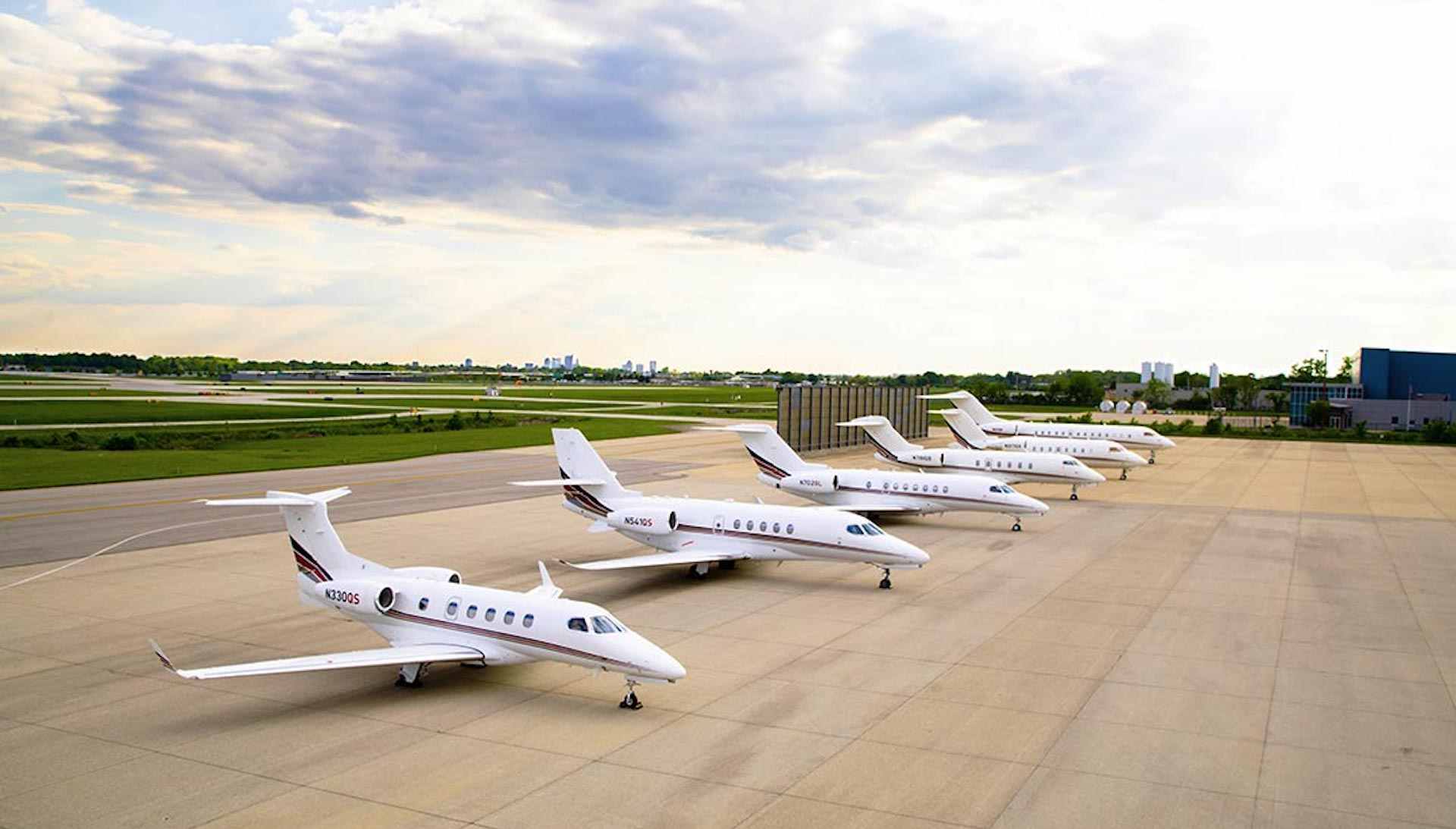 | | | | NetJets offers a full range of personalized solutions to meet — and exceed — the incredible needs and high standards of the world's most discerning travelers. Learn about the company's industry-leading safety standards, premium service, global access and more. | | | | | | Bonus: Where in the Worldle | | I'm outsourcing today's Where in the World to Worldle, a geographical take on the daily Wordle sensation. - How it works: You guess a country, it tells you how far away you are, you guess again. Click here to play.
Hat tip to copy editor extraordinaire Sheryl Miller for discovering this. |     | | | | | | 4. Global ripples roundup | 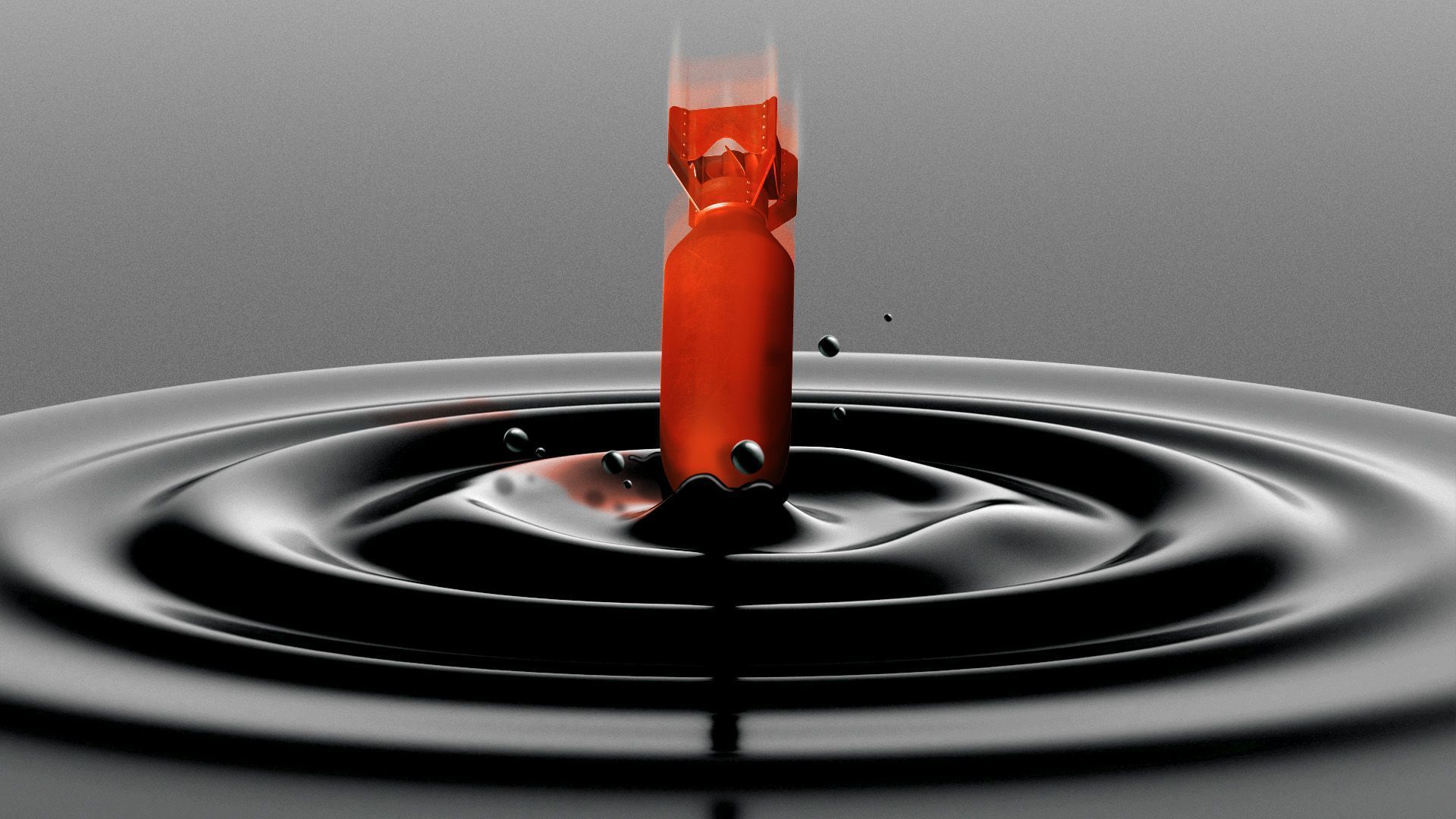 | | | Illustration: Sarah Grillo/Axios | | | | From energy prices to the cost of wheat, Russia's invasion of Ukraine had almost immediate ripple effects. Axios' Laurin-Whitney Gottbrath rounds them up. 1. Oil prices jumped above $100/barrel for the first time since 2014, and European gas prices surged following the onset of the attack. The big picture: Higher energy prices will impact everything from the cost of goods to prices at the gas pumps. - A price shock for natural gas in Europe is a particular concern. Russia is by far the largest natural gas supplier to Europe.
- What to watch: Brent crude, the global oil benchmark, slid back below $100 after President Biden signaled he didn't intend to sanction Russian oil and gas. For now, the lifeblood of the Russian economy continues to flow largely unencumbered. Biden also wants Big Oil and Saudi Arabia to ramp up production and keep prices in check, Axios' Hans Nichols reports.
2. Biden announced severe new sanctions, including sweeping export controls and a freeze on billions of dollars in Russian assets. - The new sanctions are coordinated with the G7 — countries that together make up 50% of the world's GDP — and are designed to "maximize a long-term impact on Russia and to minimize the impact on the United States and our allies," Biden said.
- Details.
3. Food prices face additional inflation risk as the war threatens supplies of wheat in the region once known as the "breadbasket of Europe," Axios' Nathan Bomey reports. 4. Moscow's stock market fell 33% today, wiping out $200 billion in value. The government is tapping foreign reserves to stabilize the ruble. - In the U.S, the S&P 500 and Dow rebounded after dropping sharply this morning.
|     | | | | | | 5. Data du jour: Exporting authoritarianism |  Reproduced from Freedom House; Map: Axios Visuals Freedom around the world declined in 2021 for the 16th consecutive year, according to an annual report from Freedom House, which warns that countries including China and Russia are exporting authoritarianism. Why it matters: "The leaders of China, Russia, and other dictatorships have succeeded in shifting global incentives, jeopardizing the consensus that democracy is the only viable path to prosperity and security, while encouraging more authoritarian approaches to governance," the report says. According to the index: - 38% of the global population resides in countries that are "not free," the highest percentage since 1997, versus 20% living in "free" countries and 42% in "partly free" countries.
- There was better news from Ecuador, which moved into the "free" column after a smooth presidential transition; Chile, where democracy has held firm and arguably deepened amid social upheaval; and the Ivory Coast, which held relatively free parliamentary elections last spring.
- Finland, Norway and Sweden are the freest countries. Eritrea, North Korea, South Sudan, Syria and Turkmenistan the least free.
Key trends: - Leaders in some authoritarian-leaning systems no longer feel the need for a "veneer" of democracy, the authors write, noting the "farcical" elections last year in Nicaragua and Russia.
- There was a surge of coups in 2021 including in Myanmar, Sudan and several West African states.
- Some leaders in democracies, such as former President Donald Trump in the U.S. and President Jair Bolsonaro in Brazil, "have taken to sowing distrust in elections" when in danger of losing power, the report notes.
- "Those countries that have struggled in the space between democracy and authoritarianism are increasingly tilting toward the latter," the authors write. The "partly free" ranks include India, which saw its ratings fall for a fourth consecutive year.
The bottom line: "Authoritarian leaders are no longer isolated holdouts in a democratizing world." - "Instead they are actively collaborating with one another to spread new forms of repression and rebuff democratic pressure," the authors argue, citing the roles China and Russia have played in propping up faltering regimes in Belarus, Myanmar and Venezuela.
|     | | | | | | 6. "You will see our faces, not our backs" | 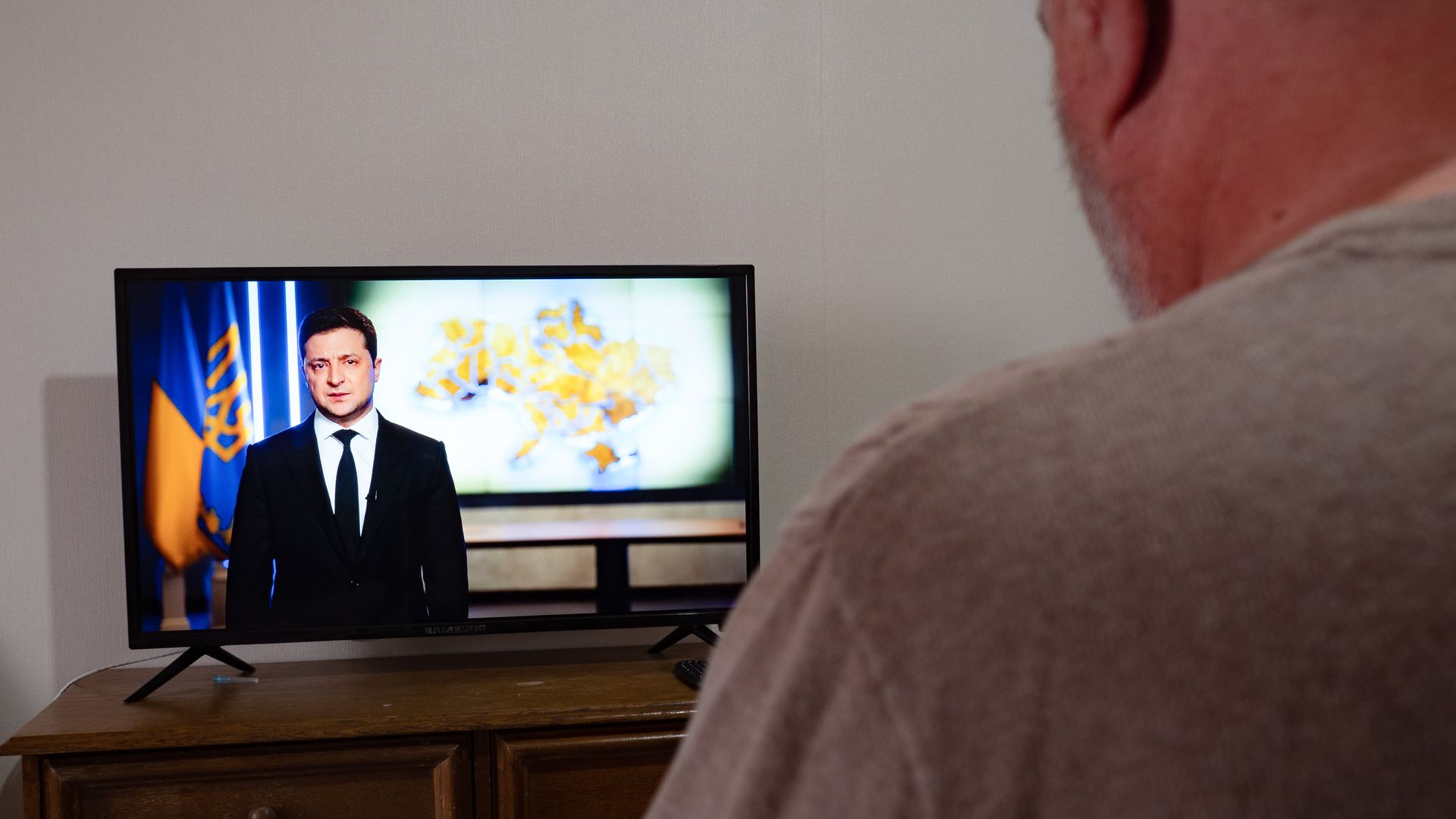 | | | Watching Zelensky's address. Photo: Igor Golovniov/SOPA Images/LightRocket via Getty | | | | Hours before Putin declared war on his country, Zelensky addressed the Russian people in their language. He said he'd tried to call Putin and sought desperately to avert war but "the result was silence." What he's saying: "You are told that this flame [of war] will liberate the people of Ukraine, but the Ukrainian people are free." Ukraine did not want war, Zelensky said, but "when attacking us, you will see our faces. Not our backs, but our faces." Between the lines: Zelensky's speech was a moving rebuttal to Putin's combative and historically revisionist hour-long address on Monday. - Zelensky said the Russian people have been told he and his citizens are Nazis, despite the fact that his grandfather fought the Nazis in the Soviet infantry.
- He said Russians have falsely been told that Ukrainians hate Russian culture and have no culture of their own. "We are different, but that is not a reason to be enemies," he said.
- He said Ukraine had never been and never will be a threat to Russia, and while Russia would never allow his speech to be shown on Russian television, "the people of Russia need to see it."
Full English translation |     | | | | | | 7. Stories we're watching | 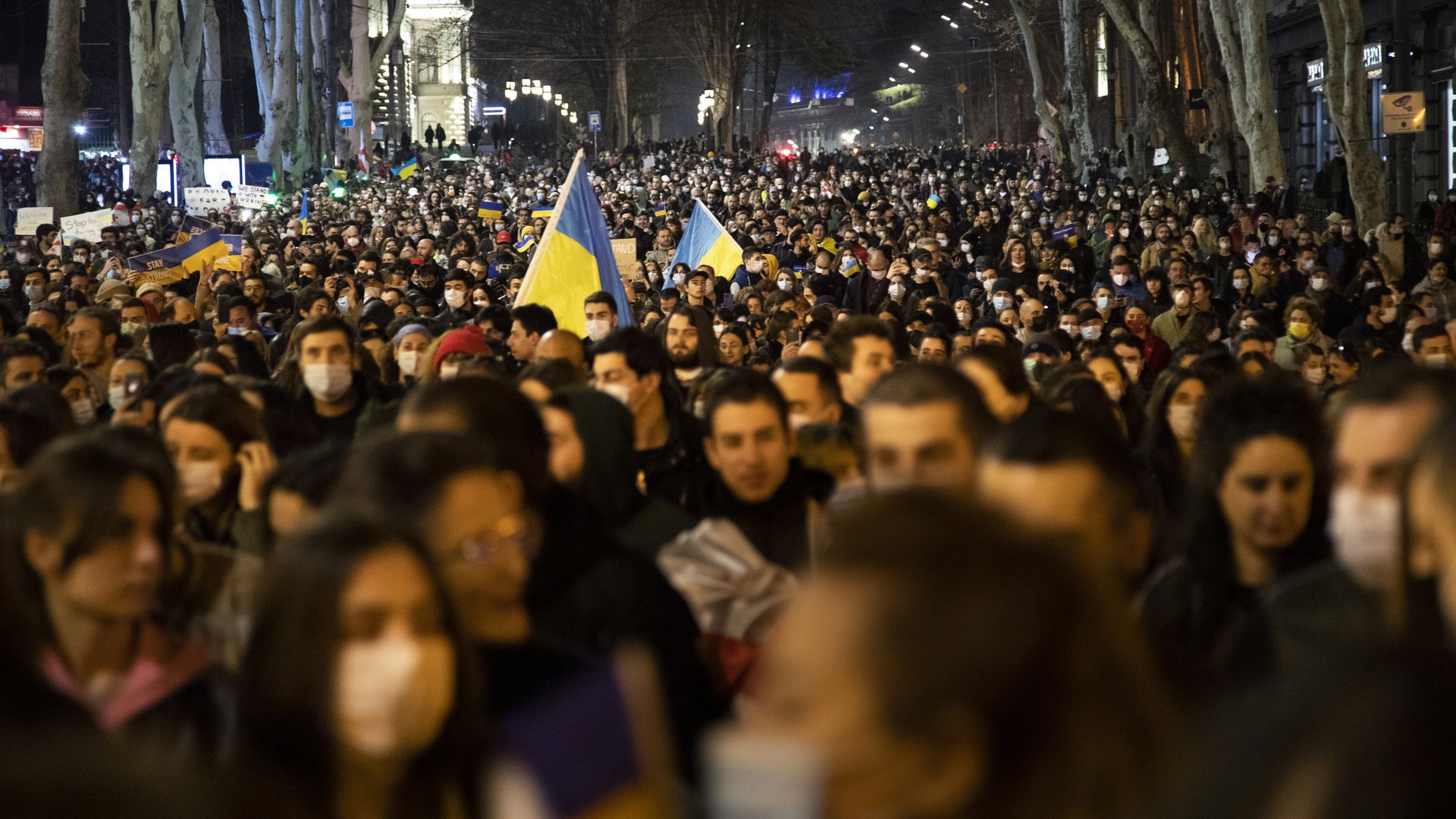 | | | One of many protests in support of Ukraine around the world tonight, in Tbilisi, Georgia. Photo: Daro Sulakauri/Getty Images | | | - Trudeau ends emergency powers invoked to quell trucker protest
- Hong Kong to enforce mandatory COVID testing
- 16-year-old Indian chess sensation beats world champion
- New democracy group targets Hungary as "battleground state"
- Cracks in Israel's coalition start to show
- Wildfire risk will jump 30% by 2050, UN says
- Iran deal watch
Quoted: "There is no purgatory for war criminals. They go straight to hell, ambassador." — Ambassador Sergiy Kyslytsya of Ukraine to his Russian counterpart during an emergency UN Security Council meeting last night to prevent war in Ukraine. Putin declared war during the meeting. |     | | | | | | A message from NetJets | | Why fly NetJets | | |  | | | | NetJets offers a full range of personalized solutions to meet — and exceed — the incredible needs and high standards of the world's most discerning travelers. Learn about the company's industry-leading safety standards, premium service, global access and more. | | |  | Bring the strength of Smart Brevity® to your team — more effective communications, powered by Axios HQ. | | | | | | Axios thanks our partners for supporting our newsletters. If you're interested in advertising, learn more here.
Sponsorship has no influence on editorial content. Axios, 3100 Clarendon Blvd, Suite 1300, Arlington VA 22201 | | | You received this email because you signed up for newsletters from Axios.
Change your preferences or unsubscribe here. | | | Was this email forwarded to you?
Sign up now to get Axios in your inbox. | | | | Follow Axios on social media:    | | | | | |











No comments:
Post a Comment